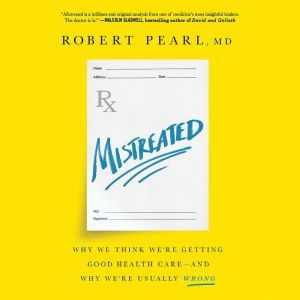Quotes
"Mistreated is a powerful read, an incredible insight into American health care, a mix of poignant personal memoir by a son, the clinical perspective of an experienced surgeon, and the vision and understanding that comes from being the CEO of one of the largest and best health care organizations in the country. Robert Pearl is all those things, and with Mistreated he proves he is also a wonderful writer."—Abraham Verghese, MD, professor of medicine,Stanford University, and author of Cutting for Stone
"Robert Pearl argues that the troubles of the American health care system begin with a problem of perception: conceptual misunderstandings that warp priorities and distort choices. Mistreated is a brilliant and original analysis from one of medicine's most insightful leaders. The doctor is in."—MalcolmGladwell, bestselling author of David and Goliath
"Mistreated is a timely and necessary book on how to fix our broken health system from one of our most important voices in health care. Dr. Robert Pearl's diagnosis isn't pretty. Morale in health care is low, costs are unmanageable, and health and survival are often worse than in other high-income countries. But Pearl is a leader who transformed his own health system to have very different results for patients and clinicians alike. And he offers that experience to show everyone the way."—AtulGawande, bestselling author of Being Mortal
"Pundits like to speculate about the future of health care,
but Dr. Robert Pearl has been busy creating it . . . at scale. As CEO of the
nation's largest medical group, he and his colleagues at Kaiser Permanente have
created a system serving 10 million members that is low cost, but with
nation-leading quality outcomes and high patient satisfaction. They haven't
just bent the cost curve, they've wrestled it into submission. If you want to understand
how to fix health care, listen to him: he knows."—Chip Heath, coauthor of Switch and Decisive
"Relying on his long history as one of the country's most
innovative and powerful physician-leaders, Dr. Robert Pearl lays bare the
shortsightedness of the broken US health care system: why we resist better
science, newer technology, and reform. He offers a vision of how to improve our
medical care, informed and tested in his own real world practice."—-Elisabeth Rosenthal, editor in chief of Kaiser HealthNews
"Drawing on psychological research and his diverse roles as physician, business professor, and chief executive, Dr. Pearl diagnoses the problems of the American health care system and offers simple yet important solutions. In a health care system undergoing rapid changes, Mistreated is an essential and trusted guide to the future."—EzekielJ. Emanuel, author of Reinventing American Health Care
"Mistreated is the honest conversation we need to have about the beautiful but broken craft of medicine."—Marty Makary, MD, New York Times-bestselling authorof Unaccountable
"A respected expert
gets personal. The result is a gripping drama set in our troubled health care
system-and happily a roadmap for fixing it."—CeciConnolly, president and CEO of the Alliance of Community Health Plans
"This is an important book. With clear and engaging examples, Mistreated reviews the fl aws in our traditional fragmented health care system, showing that context and perception matter more in health care than logic and data. This powerful insight can help our nation transform American medicine and make it the best in the world. A must-read for anyone who has ever been or will be a patient-and that is all of us."—AlainEnthoven, professor emeritus, Graduate School of Business at Stanford
"Mistreated provides a poignant and powerful portrait of what causes our health system to fail despite our best intentions. Starting with the painful story of his father's untimely death due to medical error, Dr. Pearl honors his father's memory by teaching us how to build a system that creates health and prevents harm."—Ian Morrison, PhD, author, consultant, and futurist

